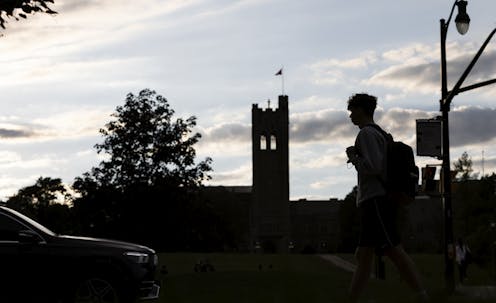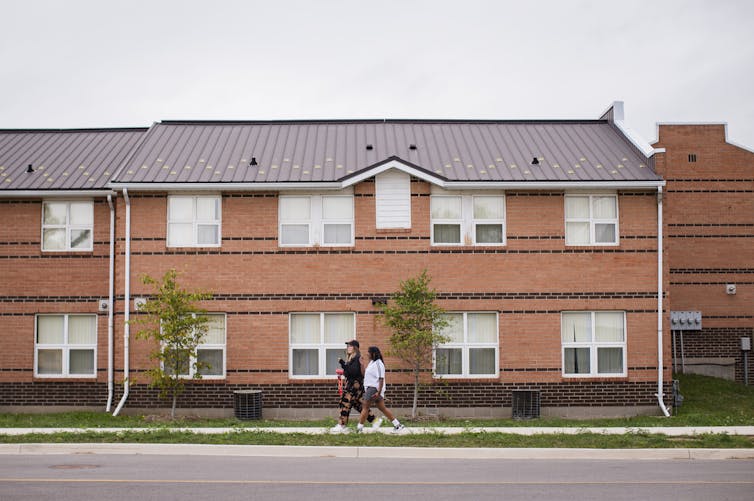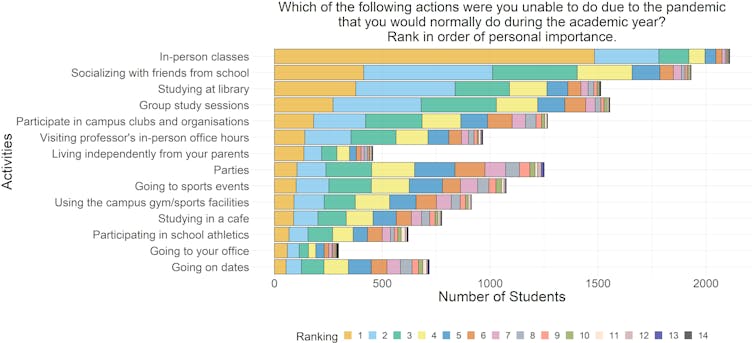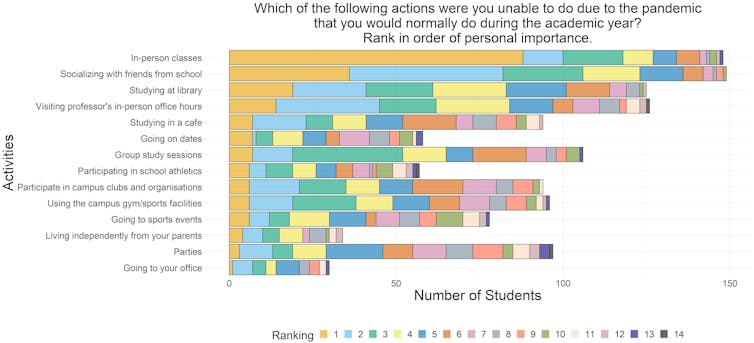
Universities are implementing COVID-19 safety plans to maintain safe and healthy environments — through protocols like enhanced cleaning or a focus on ventilation and air quality — for the imminent return of students to in-person learning on campuses.
While these plans include extensive efforts to help students safely return to pre-pandemic learning, focused attention should also be given to “university experience” activities.
We asked thousands of students around the world about what they have missed most from pre-pandemic student life, as part of a broader study on COVID-19 and higher education at the Policy, Elections, & Representation Lab at the Munk School of Global Affairs and Public Policy at the University of Toronto.
Our data suggests students miss in-person learning and activities which encourage socialization. These social opportunities are important for student well-being.
Restorative effects
The COVID-19 pandemic has had devastating effects on student health. Research shows that the pandemic has worsened emotional distress, increased risk for mental illness, raised self-reported anxiety levels among students and negatively affected sleep patterns.
Switching to online classes further exacerbated these problems, as online learning forced students to use different coping mechanisms to stay mentally healthy.
Socializing with friends from school, using the campus gym, visiting office hours and participating in campus clubs are important elements of post-secondary life.
On-campus activities can improve student well-being, contribute to positive health outcomes and support academic achievement. To support these positive student experiences, universities need to understand what students miss most from being on-campus.
A safe, social return
Universities are providing opportunities for new students to socialize during their orientation weeks. Universities have also made in-person learning and important amenities, such as campus gyms and university libraries, available to students once again.
Whether or not universities offer orientation to returning students as well as new students, all students who experienced fragmented university life since 2020 will need access to planned social activities throughout the year.

Activities students missed
We surveyed 4,812 students in 78 countries at over 1,000 unique post-secondary institutions about the student experience during the COVID-19 pandemic.
We know that students miss on-campus university life, but we wanted to know which activities in particular are most important to students.
We asked students: “Which of the following actions were you unable to do due to the pandemic that you would normally do during the academic year? Rank in order of importance.” We learned that students really missed chances to be together in person, not only due to academic concerns.
Socializing, studying, clubs
We recruited our participants via advertising on social media using Facebook and Twitter ads. Our respondents come from countries in Africa (29 per cent), South America (36 per cent), North America (18 per cent), Europe (six per cent), Asia (five per cent) and Oceania (six per cent).
Globally, students overwhelmingly missed attending in-person classes: 42 per cent of these students ranked in-person classes as the most important activity they missed. Universities are right to prioritize a return to in-person classes.
Students in our global sample ranked campus-related social activities, such as socializing with friends from school, studying at the library, group study sessions and participating in campus clubs and organizations, the next highest.

We found similar trends in Canada.

Missed opportunities
To better understand student needs, we also provided them with the opportunity to respond to an open-ended question: Is there anything about the student experience during COVID-19 pandemic that you think more people should know more about?
A student from Nigeria told us “the stay-at-home policy though was put in place for good intentions but it affected the mental health of most students.” A student in Poland wrote: “I think online classes is depriving students of social interactions which makes university stay very boring.”
A student in Canada summarized the student experience:
“I made a lot of new friends online, but it was difficult not actually seeing them. It was also disappointing to not have many sports or clubs at school. I managed to join a few clubs online, but they weren’t the same as in-person would have been, where we could’ve organized actual events … The most devastating aspect for me was missing out on the opportunities of my first year and the activities, getting to form closer relationships with students and professors, and not having the chance to grow on my own.”
Holistic student experiences
As students who started school in 2020 and 2021 arrive on campus, universities and students organizations must work hard to ensure that students receive a holistic student experience. To this end, based on our data, we have a few simple suggestions for university administrators:
Increase the number of opportunities for students to socialize. Host special events, such as concerts or talks, with free entrance for students. Encourage academic departments to host student mixers. These efforts are essential for students who entered programs after 2020 and are, therefore, less likely to know other people in their cohort.
Improve on-campus studying. Consider opening up classroom spaces for students to host group study sessions. Create more library spaces. Provide funding for study groups to buy snacks and reward student leaders for organizing group learning opportunities.
Provide greater support for student clubs and organizations. Donate on-campus event space for student-led events. Help clubs recruit new students.
As we return to pre-pandemic classroom learning, we should also return to a (safe) pre-pandemic university experience. Social life is central to education, and universities have an important role in promoting student well-being by supporting “the university experience.”
Blake Lee-Whiting received funding from the University of Toronto, and the Policy, Elections, and Representation Lab at the Munk School of Global Affairs & Public Policy.
Thomas Bergeron received funding from the University of Toronto, and the Policy, Elections, and Representation Lab at the Munk School of Global Affairs & Public Policy.
This article was originally published on The Conversation. Read the original article.







